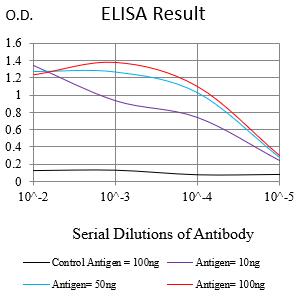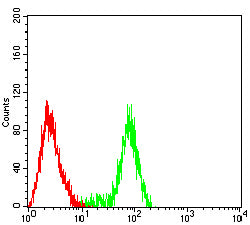

| WB | 咨询技术 | Human,Mouse,Rat |
| IF | 咨询技术 | Human,Mouse,Rat |
| IHC | 咨询技术 | Human,Mouse,Rat |
| ICC | 技术咨询 | Human,Mouse,Rat |
| FCM | 1/200 - 1/400 | Human,Mouse,Rat |
| Elisa | 1/10000 | Human,Mouse,Rat |
| Aliases | Bcl-2; PPP1R50 |
| Entrez GeneID | 596 |
| clone | 7F9B12 |
| WB Predicted band size | 26.3kDa |
| Host/Isotype | Mouse IgG2b |
| Antibody Type | Primary antibody |
| Storage | Store at 4°C short term. Aliquot and store at -20°C long term. Avoid freeze/thaw cycles. |
| Species Reactivity | Human |
| Immunogen | Purified recombinant fragment of human BCL2 (AA: 1-239) expressed in E. Coli. |
| Formulation | Purified antibody in PBS with 0.05% sodium azide |
+ +
以下是3篇关于BCL2抗体的经典文献摘要概述:
1. **《Bcl-2 gene promotes haemopoietic cell survival and cooperates with c-myc to immortalize pre-B cells》**
- **作者**: Vaux, D.L., Cory, S., Adams, J.M.
- **摘要**: 首次证明BCL2通过抑制细胞凋亡延长细胞存活,与c-Myc协同作用促进B细胞永生化,为BCL2在肿瘤发生中的作用提供机制基础。
2. **《Bcl-2 protein expression in normal human tissues and carcinomas》**
- **作者**: Hockenbery, D.M., et al.
- **摘要**: 通过免疫组化分析BCL2蛋白在正常组织与癌组织中的分布,发现其在特定癌组织(如滤泡性淋巴瘤)中高表达,提示其作为肿瘤标志物的潜力。
3. **《Targeting BCL2 with Venetoclax in Relapsed Chronic Lymphocytic Leukemia》**
- **作者**: Roberts, A.W., et al.
- **摘要**: 报道BCL2特异性抑制剂Venetoclax在复发/难治性慢性淋巴细胞白血病(CLL)中的临床疗效,证明靶向BCL2可诱导肿瘤细胞凋亡,推动靶向治疗发展。
以上文献涵盖了BCL2的功能机制、病理表达特征及靶向治疗应用,适用于凋亡研究、癌症诊断和治疗领域。
The BCL2 (B-cell lymphoma 2) protein is a key anti-apoptotic regulator encoded by the BCL2 gene, primarily located on the mitochondrial outer membrane. Discovered in 1985 through its association with chromosomal translocations in B-cell lymphomas (notably t(14;18) in follicular lymphoma), BCL2 promotes cell survival by inhibiting programmed cell death (apoptosis). It counteracts pro-apoptotic BCL2 family proteins (e.g., BAX, BAK) to maintain mitochondrial membrane integrity, preventing cytochrome c release and caspase activation.
BCL2 antibodies are critical tools in research and diagnostics. In cancer pathology, they help identify BCL2 overexpression linked to lymphomas, leukemias, and certain solid tumors. Immunohistochemistry (IHC) using BCL2 antibodies aids in distinguishing lymphoma subtypes (e.g., follicular vs. reactive hyperplasia) and assessing tumor aggressiveness. However, BCL2 expression is context-dependent; it is normally present in follicular center B-cells and some epithelial tissues.
Therapeutically, BCL2 inhibitors like venetoclax (targeting BCL2's BH3 domain) exploit its role in cancer cell survival. Recent studies also explore BCL2's involvement in drug resistance and immune evasion. Despite its prominence in apoptosis, BCL2 has non-canonical roles in autophagy, mitochondrial dynamics, and calcium signaling, complicating its functional landscape.
BCL2 antibodies remain indispensable for unraveling its dual roles in health and disease, driving advancements in precision oncology and apoptosis-targeted therapies.
×